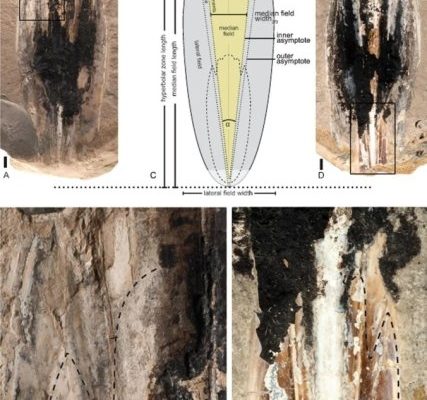Researchers have discovered fossils of a Jurassic vampire squid that drowned because it was too busy eating its prey.
Fossils of a vampire squid specimen from the Early Jurassic were discovered in Luxembourg and dated to about 180 million years ago. The researchers note that this find is incredibly valuable and could help reveal the poorly understood origins of this unique species, which went extinct millions of years ago, writes IFLScience.
The remains indicate that the ancient vampire squid was buried on the seabed along with its prey. The authors of the study believe that the animal was so carried away by eating prey that it did not notice how it sank into dangerous, oxygen-poor waters, from which it simply could not get out and drowned.
At Focus. Technologies have appeared Telegram channel. Subscribe so you don’t miss the latest and most exciting news from the world of science!
Note that vampire squids are not true squids—they are actually more closely related to octopuses than to the creatures they are named after. Scientists note that members of this family can be easily recognized in the fossil record as they have 8 arms and two filaments, which squids use for hunting. Note that other species do not have filaments, but instead have larger tentacles.

Gladius (hard mouthparts) Simoniteuthis michaelyi, viewed from different angles and diagrammatically illustrated
Photo: Swiss Journal of Palaeontology
It is known that representatives of this species grew up to 38 centimeters and lived in shallow water. They had a hard part known as the gladius, as well as 8 arms which are used for feeding. However, researchers note that this ancient species still remains poorly understood.
The study authors note that the fossils belong to a new species of vampire squid that was previously unknown to science – they were named Simoniteuthis michaelii. It is curious that the squid died during the hunt: two fish were found not far from its mouth, which it probably held with its hands.
It is believed that the ancient squid died as a result of a distracting dive: in simple terms, it was so engrossed in its prey that it did not realize how it was drowning in waters incredibly poor in oxygen – as a result, the squid simply had no chance to escape or survive.

Slab (A–D) and counterslab (E–G) of a vampire squid fossil with overview and close-up of important parts, and under ultraviolet light, including arm musculature (C and D) and prey. on fish (F)
Photo: Swiss Journal of Palaeontology
Interestingly, scientists previously discovered two vampire squid of a different species that died in a similar manner, but at that moment one of them seemed to be feeding on the other. The team notes that in oxygen-depleted waters, fossils are actually much more likely to survive.
Modern vampire squids are known to have evolved adaptations to hypoxic waters, but scientists believe these evolved long after the ancient vampire squid died. The researchers also note that partial traces of all eight arms are visible in the S. Michaelyi fossil, but the scientists did not find any traces of filaments or tentacles. Nevertheless, the researchers are confident that this is a vampire squid, and not a representative of another species.
The study’s authors note that the discovery of the fossil should shed light on the evolution of this family of squid, but so far only more questions have arisen. For example, scientists still don’t know exactly when these animals developed the threads they use to catch small organisms and collect “sea snow.”
Previously Focus wrote that 165 million years ago a fleeing vampire lived in the ocean.









